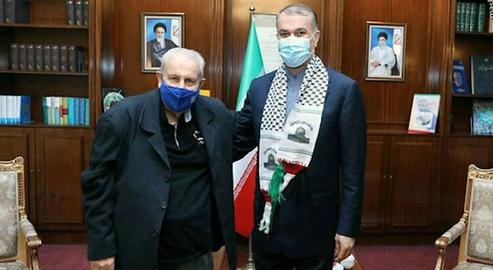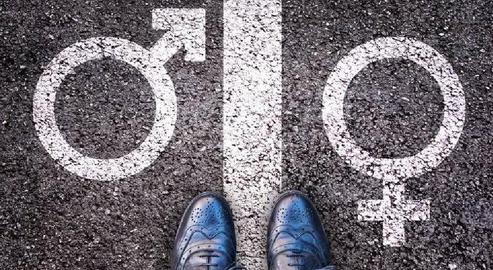Last week Salah al-Zawawi, Palestinian ambassador to the Islamic Republic of Iran, ended his 41-year mission at the embassy in Tehran. The diplomat clung onto his position for four difficult decades, in which he was snubbed in the Iranian corridors of power during a breakdown of relations with the PLO – and, allegedly, he criticized his own party’s leadership behind closed doors. He has now been succeeded in the role by his daughter, Salam al-Zawawi.
On Thursday, January 6, Al-Zawawi joined Iranian Foreign Minister Hossein Amir-Abdollahian for a farewell photo op in which he presented the minister with a kefiyyeh: a Palestinian scarf and symbol of resistance. His diplomatic presence in the Islamic Republic since 1980 earned him the nickname Moghaddam al-Safara: roughly, the First Ambassador, as well as a more prominent role at official ceremonies and gatherings than most of his counterparts.
Behind the pageantries, however, all was not well during Al-Zawawi's tenure. He had had a strained relationship from the get-go with Ayatollah Ali Khamenei, who became president of the Islamic Republic less than a year after his mission began.
Trapped in the Middle of Iran-Iraq War Fallout
By the time Ayatollah Ruhollah Khomeini died, Salah a-Zawawi had been in Tehran for nine years: his fourth ambassadorial role following stints Algeria, Brazil and Kenya. He had also been one of the founders of the Palestinian nationalist Fatah party, the largest faction in the multi-party Palestine Liberation Organization (PLO). Fatah member and PLO chairman Mahmoud Abbas is the current president of the State of Palestine and the Palestinian National Authority.
Al-Zawawi, however, began his mission in Tehran at a time when the PLO had lost its formerly good standing in the eyes of the rulers of the Islamic Republic. Then-PLO chairman Yasser Arafat had been the first foreign “revolutionary” leader to come to Tehran after the 1979 revolution, taking over the ransacked former Israeli embassy along with a 58-member delegation. But he then backed Saddam Hussein when Iraq invaded Iran in 1980, which was unforgivable to the Islamic Republic.
As a still relatively new ambassador to Iran, al-Zawawi ended up supporting mediation efforts, led by Arafat, aimed at a ceasefire between Iran and Iraq. In mid-September 1985, shortly after Iranian forces had liberated Khorramshahr, al-Zawawi sent a secret communique to Akbar Hashemi Rafsanjani: then the speaker of the Iranian parliament and Khomeini’s representative on the Supreme Defense Council, who was effectively running the war but also lobbied for peace behind the scenes. In his message, al-Zawawi said that the Jeddah-based Organization of Islamic Conference (OIC)’s peace committee had condemned “the threats to airlines, the use of chemical weapons, and the bombardment of cities in the [Iran-Iraq war], and has called for a commission to identify and prosecute the aggressor and allocate an Islamic fund to compensate the damage that has been done."
"If this news is true,” Rafsanjani wrote in his diaries at the time, “it is a step toward satisfying us." He also wrote that Baghdad had objected to the OIC’s statement.
Khamenei and the wider Islamic Republic, however, did not approve of Arafat's mediation. Al-Zawawi’s exertions in Tehran, urging Iranian officials to make contact with Arafat, were ultimately unsuccessful. "This evening,” Rafsanjani wrote, “Mr. Al-Zawawi came and brought a letter from Yasser Arafat asking us to agree to the ceasefire. He asked us for a Palestinian delegation to be admitted to mediate, and offered to invite the foreign ministers of the Gulf states, asking for my help."
As the Islamic Republic’s relationship with the PLO fell apart, Rafsanjani also writes that Khamenei stopped replying to the Palestinians’ letters. “The Palestinian ambassador came to visit me... The situation is worrying. He is disappointed with the Arabs, who have been drawn to conservatism. They are under pressure in Lebanon and elsewhere, including Jordan. He insisted that the Islamic Republic should rush to their aid and rescue them from trouble.
“Internal disputes are a major problem for them. He wants the President [Khamenei] to respond to a letter from [Yasser] Arafat or send a delegation there and invite Yasser Arafat [to meet them]. I have said that Arafat's invitation will be a problem before the change of his official position. Administrative problems are also a hindrance in Iran."
In the mid-1980s, Rafsanjani wrote, Iranian officials had refused to go to Palestine as requested. "Mr. [Salah] al-Zawawi, the Palestinian ambassador, came [to me]. While acknowledging the misguided policies of the Fatah’s leadership, he complained that Iran had not provided much assistance to the Palestinian people and Iranian officials did not visit them. I recognize the need to provide more welfare assistance to the Palestinians."
Demands to Tehran, Disparaging the PLO
Tehran’s relationship with the PLO remained sour – then darkened even further – after the Iran-Iraq war and Khomeini’s death. After Ali Khamenei became Supreme Leader, Arafat signed the Oslo Accords in 1993 and 1995: two agreements with the government of Israel aimed at initiating a peace process, with some involvement from the Clinton administration in the US.
The Islamic Republic referred to Israel in its official discourse as an “enemy” and a state of “usurpers” that ought to be “eliminated” from the map. Perhaps unsurprisingly in 1998, three years after the second Oslo Accord was signed in Taba, Egypt, Khamenei refused to meet with Arafat when Tehran hosted the Eighth Islamic Summit.
During preparations for the summit, Al-Zawawi made a special request of now-President Rafsanjani and his officials. "The Palestinian ambassador and his deputy arrived,” writes Rafsanjani. “They had suggestions such as naming the Islamic Summit the Quds Conference, and holding an exhibition for Palestine either at the embassy or adjacent to the summit, and trying to repair strained relations with Algeria, Egypt and the UAE during the conference. Instead of being completely opposed to peace, Iran should issue a plan agreeable to the world today. They said the elimination of Israel could not be an option at this time."
In the end, none of Al-Zawawi’s suggestions were carried forward, and Arafat was refused an audience with the Supreme Leader. Rafsanjani reports that Al-Zawawi sat next to his shunned leader in the waiting room during the summit, only to be turned away: “My preference was to accept [a meeting], but we did not.”
Less than a year later, Khamenei used a Friday sermon on October 30, 1998 to utter statements that were once unimaginable, calling Arafat "a traitor and a fool." Despite the now open hostility on the part of Khamenei, Al-Zawawi was not expelled from Tehran; in fact, he did not so much as object, and remained in Tehran for some considerable time before his next visit home.
Salah al-Zawawi was a hardier ambassador than most. Alienation from the Office of the Supreme Leader did not compel him to abandon his post – and, Rafsanjani says, he also privately criticized the PLO a second time in September 1995, just weeks before the second Oslo Accord was signed. “The Palestinian ambassador came,” writes Rafsanjani on September 2. “He criticized Arafat and the Palestinian and Arab compromisers. He also demanded money from the Islamic Republic for the expenses of his embassy.”
Remarkably in 2016, Al-Zawawi also took no flack after Palestinian leader Mahmoud Abbas met with Maryam Rajavi, leader of the Mojahedin-e Khalq Organization [MEK], in Paris. The MEK is an opposition group outlawed by Tehran. But contrary to normal procedure, Zawawi was not so much as summoned by the Foreign Ministry.
Al-Zawawi’s wife's body is buried in Tehran, and he has given no indication that he will return to his place of birth after retirement. His daughter, who grew up in Iran, has now taken his place as ambassador.
Related coverage:
Khamenei's "Final Solution" for the Israeli Question
Hamas and Iran: Time for Reconciliation?
Soleimani's Favorite Palestinians
Fact Check: Did Ayatollah Sistani Object to the Normalization of Arab-Israeli Relations?
visit the accountability section
In this section of Iran Wire, you can contact the officials and launch your campaign for various problems































comments